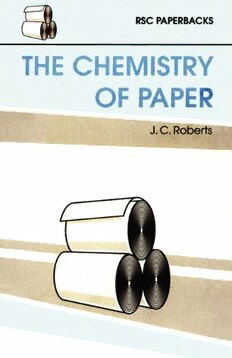
Chemistry of Paper (RSC Paperbacks) PDF
208 Pages·1996·11.008 MB·English
Most books are stored in the elastic cloud where traffic is expensive. For this reason, we have a limit on daily download.
Preview Chemistry of Paper (RSC Paperbacks)
Description:
For what is thought of as an essentially mechanical process, paper manufacture involves a large amount of chemistry. The Chemistry of Paper provides an overview of the process of making paper from a chemical perspective. It deals with both the chemistry of paper as a material and the chemistry of its production, setting out the main principles involved at every stage of the process. Early chapters provide a chemical definition of paper in the light of the many uses to which it is put. Subsequent chapters deal with the chemical processes involved in the production of paper; the delignification of the wood fibres performed at elevated temperature and pressure, the bleaching of the cellulose-rich pulp using environmentally-friendly systems, the formation of the pulp into sheets of fibres strengthened by extensive inter-fibre hydrogen bonding and, finally, the coating of the sheets in a manner appropriate to their end use. Chemistry is involved at every stage of the process, including carbohydrate chemistry, the chemistry of inorganic pigments and organic resins, colloid and surface chemistry, as well as elements of environmental and analytical chemistry. The Chemistry of Paper provides an informative and entertaining overview of the chemical principles involved. It will be especially suitable for students and others who require an introduction to the chemistry of paper manufacture.
See more
The list of books you might like
Most books are stored in the elastic cloud where traffic is expensive. For this reason, we have a limit on daily download.
